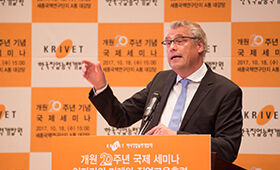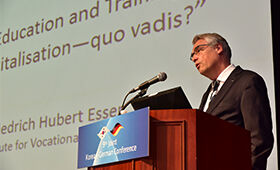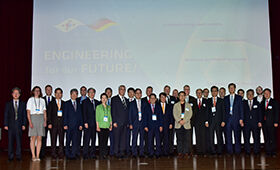Issues relating to the future of vocational education and training in the digital age
Questions regarding the future of vocational education and training are becoming ever more global in nature. Speaking in South Korea at the 9th German-Korean Academic Research Conference and later at a special anniversary event hosted by BIBB’s partner the Korea Research Institute for Vocational Education and Training (KRIVET), Professor Dr. Friedrich Hubert Esser took the opportunity to address the opportunities and challenges that digitalisation is creating for vocational education and training.

9th German-Korean Academic Research Conference
The 9th German-Korean Academic Research Conference, which bore the title of “Engineering for our Future”, was held at the Kimdaejung Convention Centre in Gwangju on 17 October. The main topics at this year’s event were “sustainable energy and electro-mobility”, “robotics and automation”, “healthcare provision and medical technology” and “smart urban planning”. The conference was opened by the former South Korean Prime Minister Hwang-Sik Kim, and German representatives from the fields of policy making and academic research were also on hand to give welcome addresses to the audience.
“Adapting vocational training, conducting social dialogue” (Prof. Friedrich Hubert Esser)

In his subsequent keynote speech, BIBB President Friedrich Hubert Esser addressed an assembly of prominent German and Korean guests from trade and industry and from the research community on the opportunities and challenges of digitalisation. “In Germany, there are good reasons for having a strong system of vocational education and training which is particularly attractive for the SME sector of the German economy. At the same time, the shift towards a so-called “Economy 4.0” is creating major challenges for the dual system. Automation and digitalisation processes must not be permitted to devalue the know-how of skilled workers.” Professor Esser then went on to say that initial and continuing vocational education and training needed to react to the changed requirements. “Within vocational training processes, a greater focus must be placed on improving understanding of systems and processes and on strengthening individual decision-making and trouble-shooting skills,” he continued.

Professor Esser also stressed the significance of engaging in broadly based social dialogue on the aims behind the use of digital technologies. “As well as conducting a series of current studies and projects on digitalisation which are contributing to the development of the VET system at a national level, BIBB is heavily involved in international cooperation work. This is highly important to the further development of vocational education and training and forms a key foundation in this regard.”
Meeting with KRIVET President Dr. Yong-Soon Lee
The next stage of the BIBB President’s South Korean trip saw him move on to the “Korea Research Institute for Vocational Education and Training” (KRIVET) in Sejong for a visit to help mark the organisation’s 20-year existence.
Prior to attending a special anniversary conference, Professor Esser held a meeting with KRIVET’s President Dr. Yong-Soon Lee. During their discussions, the two men looked back on the fruitful cooperation that has taken place between KRIVET and BIBB in the field of VET research over the past years and addressed the issue of future projects and main research focuses to be undertaken by the institutes. Both presidents emphasised the value of German-Korean cooperation for their respective bodies within the scope of partnership arrangements that go back to the year 2000.
Special anniversary conference to mark 20 years of KRIVET
In his speech to the Anniversary Conference, Professor Esser underlined the key role played by companies and by cooperation between all stakeholders involved in ensuring that vocational education and training remains sustainable. “Active use must be made of the areas of creative leeway that are arising in the wake of digitalisation. In order for this to happen, companies will need to state their skills requirements and the vocational education and training system will have to react flexibly to the changed requirements. At the same time, the diversity, individuality and effectiveness of digital media are opening up new opportunities for vocational teaching and learning. The emphasis needs to be on establishing a sensible link between tried and tested process-oriented training concepts and new media and technologies.”
The KRIVET 20th Anniversary Conference took place at the institute’s new headquarters in Sejong on 18 October. Representatives from government and from VET research and practice were invited to attend the event, which was held under the motto of “The Future of Work and TVET”. After a formal opening address by the KRIVET President, guests were also greeted by Jun Young Kim, Chair of the National Council for Economic, Human and Social Sciences, by the Deputy Prime Minister and Minister of Education Sang-Kon Kim and by Young-Joo Kim, Minister of Employment and Labour. International experts from the OECD and ILO were also present alongside the BIBB President in order to explore perspectives for the future of work and vocational education and training.
Background information
South Korea is a high-performing and modern economy whose flagship companies include leading technological groups such as Samsung, Hyundai and LG. The country has a highly effective university sector and state-of-the-art infrastructure. Its mobile telephone network has also been the first to adopt fifth generation technology. As a result, South Korea enjoys the fastest Internet access in the world. At the same time, it also faces major challenges brought about by a rapidly ageing population, ongoing structural economic change as a result of digitalisation, and high rates of youth unemployment. These challenges are shaping current political, societal and academic debate. South Korea views Germany as a role model in international cooperation. Not the least of the reasons for this are the latter’s high quality training system and strong SME sector.
The Korea Research Institute for Vocational Education and Training (KRIVET) was founded as a national research centre in 1997. It reports to the Prime Minister and forms part of the National Council for Economic, Human and Social Sciences. Alongside its research remit, the Institute supports state policy in the field of vocational education and training. KRIVET and BIBB have been successfully working together on the basis of a cooperation agreement since 2000. The main focus of cooperation so far has been on VET research.
The Germany-Korea Alumni Network (ADeKo), which was established in 2006, and the German Academic Exchange Service (DAAD) have been working in conjunction with the Germany Embassy in Seoul and various other German and Korean partners for several years to host academic research conferences. Bodies providing funding for these include the German Federal Ministry of Education and Research. “Joint Korean-German Conferences” are one of the most significant events in German-Korean cooperation and take place each year in Germany and Korea alternately.